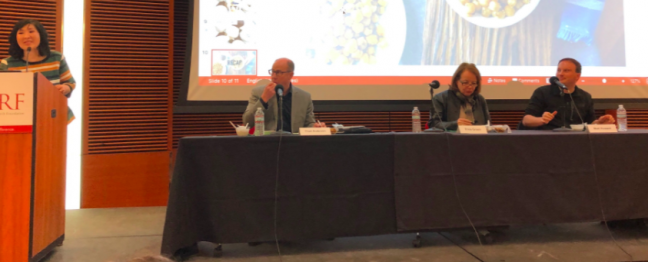As part of the Wisconsin Alumni Research Foundation’s Entrepreneurons series, WARF hosted three food-based entrepreneurs in a panel to discuss their success and offer advice to beginning entrepreneurs Monday night.
The panel was comprised of EatStreet co-founder and University of Wisconsin alumnus Matt Howard, former Food Network CEO and UW alumna Erica Gruen and co-founder of NewTree Fruit Company Chad Anderson.
The panel was moderated by local food blogger Alice Choi.
Howard said he co-found the company with his friend Alex Wyler when he was a junior at UW. What started as a “hobby” has spread to more tahn 250 cities, however, Howard said they are proud to remain based in Madison.
“I’m very passionate about pushing entrepreneurship forward here in the city of Madison and Wisconsin and general,” Howard said.
The panelists went on to describe how they got involved in entrepreneurship.
Howard said when the company first started “he wore every hat except technology,” adding this helped him understand the company better and has made him better at hiring.
Gruen also began her entrepreneurial career while still a student at UW, starting a folk music society that organized concerts at UW. Gruen said after the society’s first concert sold out she became “seduced by show business,” which is what eventually lead her to the Food Network.
Anderson, who grew up on a farm in northwest Iowa, said he became an entrepreneur because he was a bad farmer. He attended the University of Iowa and became involved in the food industry, eventually co-founding NewTree Fruit Company, the first company to take the natural sugars out of fruit juice.
Anderson said the company was developed to address the issue of people avoiding nutritious fruit juice because of its high sugar content.
“It’s maybe the pursuit of what can’t be done,” Anderson said. “We were just trying to solve, as we’ve done hundreds of times before, something that was a problem.”
The panelists went on to discuss the difficulties of starting a business, Gruen said as the second woman to run a television network in the U.S., she did not have many mentors. Gruen added that, through her work with food and tech companies, she has noticed female founders have a harder time raising money because of the lack of female venture capitalists.
Howard shared his own struggles raising money, saying that he was rejected 40 times before he found someone willing to invest in EatStreet. Getting investors is so difficult you need to “know your business inside and out,” he said.
“Your ultimate goal when you’re doing a pitch … is to show [the investor] ‘Here’s the plan that I have and here’s why it’s not risky,’ but it’s inherently very risky,” Howard said.
The panelists then gave advice to beginning entrepreneurs in a live pitch session.
The first pitch was for a Persian yogurt that was low fat, had no added sugar and would be paired with whole wheat crackers. The panelists liked the taste and suggested that the team play up the nutritional value when marketing.
The second pitch came from UW nutritional science students and was for a chickpea-based vegan meringue. The meringue was made from the waste product of companies that already use chickpeas, like various hummus brands.
Howard suggested they look into more products that could be made from this chickpea waste, but overall the panelists loved the taste.
The panelists advised both teams to emphasize what sets them apart from other products when marketing and Anderson added that using your “story” is essential to being a successful entrepreneur.
“Everyone has a great story … these experiences, these are what make us,” Anderson said. “But also try not to follow, make your own path as well.”


